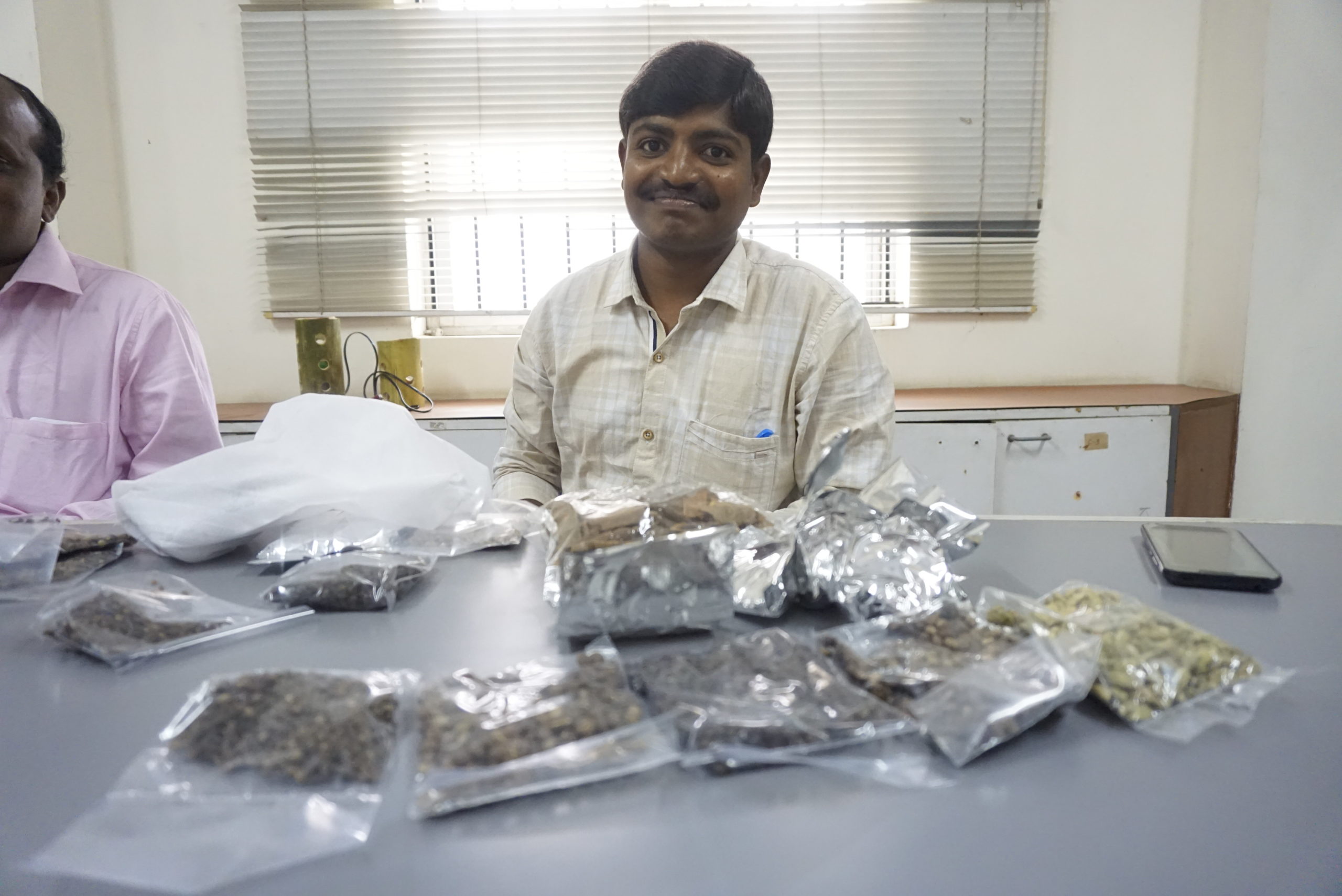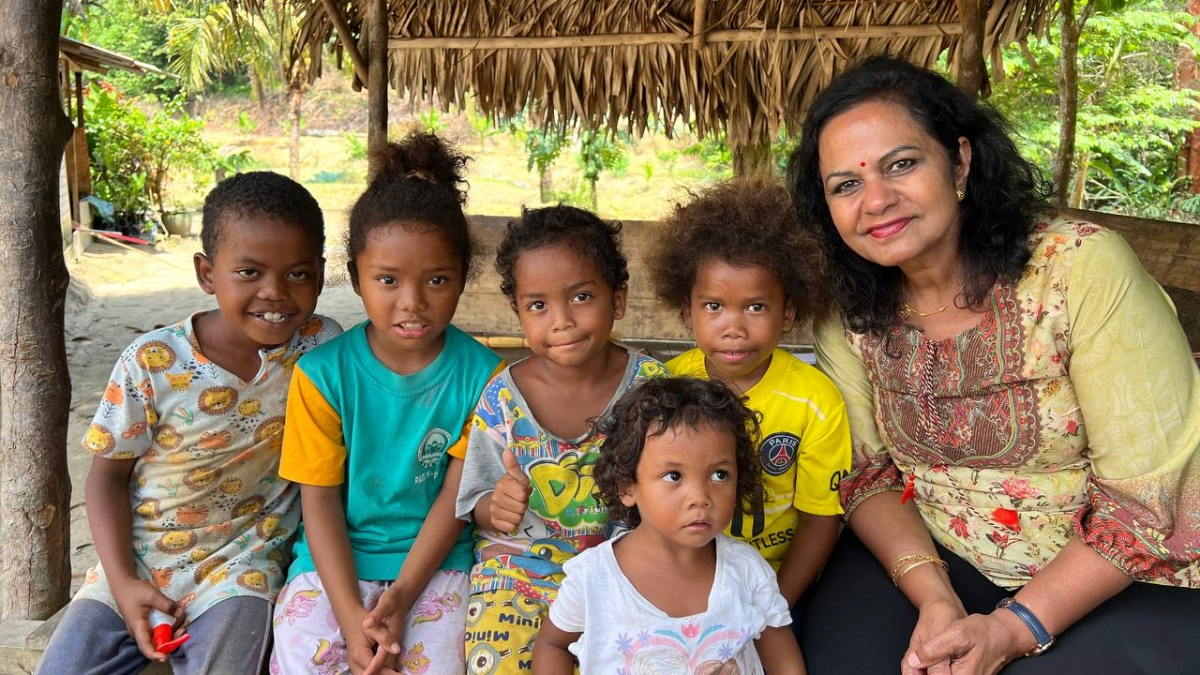Thiruppathi Perumal was 25 years old when he was awarded the Sadguru Gnanananda Fellowship, which was funded by RYTHM Foundation to carry out sustainable livelihood projects in Kolli Hills area, near Salem, South India, in 2017.
The son of a farmer, Thiruppathi’s main project involved working with farmers in Kolli Hills to enhance their produce and profit margin.

“The idea to work with the farmers and tribal communities in Kolli Hills came after my course mates and I spent 10 days camping at the hill station in 2010. During the stay, we learned about the struggles faced by the communities for basic amenities and the lack of access to healthcare and education,” he said.
After he returned to Chennai, Thiruppathi could not stop thinking about the people he met in Kolli Hills.
“I went back to carry out more studies from 2013 to 2015. Then I started the Abhinavgram Society together with like-minded students and friends who wanted to help them,” he said.
His journey since then had been a rocky one, including being threatened by goons hired by middlemen who warned him to stop his work.
“When I went to Kolli Hills and saw the poor tribal farmers who were cheated out of their profit by unscrupulous middlemen, I wanted to do something for them. In the process, I think I might have angered some people,” he said with a smile.
“During the early days of the programme, I lived alone in a rented house in Kolli Hills to carry out the studies and help the farmers. The goons would knock on the doors in the wee hours and even broke the door locks to scare me. They also came in groups and advised me to go back to my hometown and let things be the way they were,” he said.
“I was scared, they were muscular and so many of them versus me alone. But I could not pack and leave as the farmers’ future depend on my work. So, I stayed on with the support of the locals especially the farmers who began to see higher profit margins from their products,” he said.
One of the things Thiruppathi did was establishing clusters where about 15 to 25 farmers formed one cluster.

“Then we opened bank accounts for each individual and for the first time in their lives, the farmers received cheques for the products which helped provide a paper trail for their produce and profits. We also opened bank accounts for each cluster so that they could apply for government grants and schemes,” he said.
“In the first year, the farmers saw a profit of Rs 78 per kilogramme of coffee and Rs 120 per kilogramme of pepper. Before this, there was no proper weighing of their produce and they were paid according to what the middlemen decided,” he said.
“In the first year, we completed two rounds of sales, where we sold more than 20 tonnes of coffee and two tonnes of pepper through direct marketing at a fair price,” he said.
When the farmers saw the profit margin, they agreed to give a credit of up to seven days for their products to Thiruppathi.
“The first batch of 11,000 kilogramme coffee and 7,000 kilogramme pepper were given in credit to us. That allowed us more time to market their products to other parties. That opened up more channels and today the Indian Tobacco Company buys and sells the Kolli Hills coffee to Canada and Middle Eastern countries,” he said.
Besides marketing their products, Thiruppathi also got in touch with the Spices Board of India and facilitated training and awareness for the farmers on how to prevent crop wastage. He also engaged with the Tamil Nadu Agriculture University in Coimbatore to carry out soil testing, engage in organic test and produce organic certification.
The farmers were exposed to methods of organic farming (also known as jeeva amirtham) and better field farming as practiced in their neighbouring state, Kerala.
“Farmers are the most important component of the society that we live in today and it is our responsibility to ensure they get a fair price for their produce. I am not against middlemen but they must act fairly,” he said.
“From the 11,000 kilogramme of coffee given to us in 2017, today we are getting 30,000 kilogramme. With the training and better farming methods, their output has increased almost three fold,” he added.
Thiruppathi has come a long way from the initial three villages to 28 villages now.
“By April 2020, we are confident the number will rise to at least 50 tribal villages,” he added.
His future plans include engaging with those who support fair pricing.
“We are also looking to introduce new crops such as nutmeg and cocoa for additional income for the farmers and expose them with machinery support and technology investment for bigger sale quantity,” he added.
His other projects involve educating women from tribal communities in clean birth practices and providing them with training to make ornaments, pickles, and masala, as a means of income.
Thiruppathi is among the three social entrepreneurs sponsored by RYTHM Foundation under the Sadguru Gnanananda Fellowship, a project of Manava Seva Dharma Samvardhani Trust (MSDS).

The fellowship is offered to young citizens who are socially conscious and work with people in rural areas or marginalised groups. Through the fellowship, the recipients are given Rs 10,000 monthly for three years, to help them build their respective projects that will benefit the communities and turn them into a sustainable source of income.
RELATED ARTICLE:
RYTHM Foundation Joins MSDS In Empowering Social Entrepreneurs Through Sadguru Gnanananda Fellowship Project
 “The idea to work with the farmers and tribal communities in Kolli Hills came after my course mates and I spent 10 days camping at the hill station in 2010. During the stay, we learned about the struggles faced by the communities for basic amenities and the lack of access to healthcare and education,” he said.
After he returned to Chennai, Thiruppathi could not stop thinking about the people he met in Kolli Hills.
“The idea to work with the farmers and tribal communities in Kolli Hills came after my course mates and I spent 10 days camping at the hill station in 2010. During the stay, we learned about the struggles faced by the communities for basic amenities and the lack of access to healthcare and education,” he said.
After he returned to Chennai, Thiruppathi could not stop thinking about the people he met in Kolli Hills.
 “Then we opened bank accounts for each individual and for the first time in their lives, the farmers received cheques for the products which helped provide a paper trail for their produce and profits. We also opened bank accounts for each cluster so that they could apply for government grants and schemes,” he said.
“In the first year, the farmers saw a profit of Rs 78 per kilogramme of coffee and Rs 120 per kilogramme of pepper. Before this, there was no proper weighing of their produce and they were paid according to what the middlemen decided,” he said.
“Then we opened bank accounts for each individual and for the first time in their lives, the farmers received cheques for the products which helped provide a paper trail for their produce and profits. We also opened bank accounts for each cluster so that they could apply for government grants and schemes,” he said.
“In the first year, the farmers saw a profit of Rs 78 per kilogramme of coffee and Rs 120 per kilogramme of pepper. Before this, there was no proper weighing of their produce and they were paid according to what the middlemen decided,” he said.
 The fellowship is offered to young citizens who are socially conscious and work with people in rural areas or marginalised groups. Through the fellowship, the recipients are given Rs 10,000 monthly for three years, to help them build their respective projects that will benefit the communities and turn them into a sustainable source of income.
RELATED ARTICLE:
RYTHM Foundation Joins MSDS In Empowering Social Entrepreneurs Through Sadguru Gnanananda Fellowship Project
The fellowship is offered to young citizens who are socially conscious and work with people in rural areas or marginalised groups. Through the fellowship, the recipients are given Rs 10,000 monthly for three years, to help them build their respective projects that will benefit the communities and turn them into a sustainable source of income.
RELATED ARTICLE:
RYTHM Foundation Joins MSDS In Empowering Social Entrepreneurs Through Sadguru Gnanananda Fellowship Project





